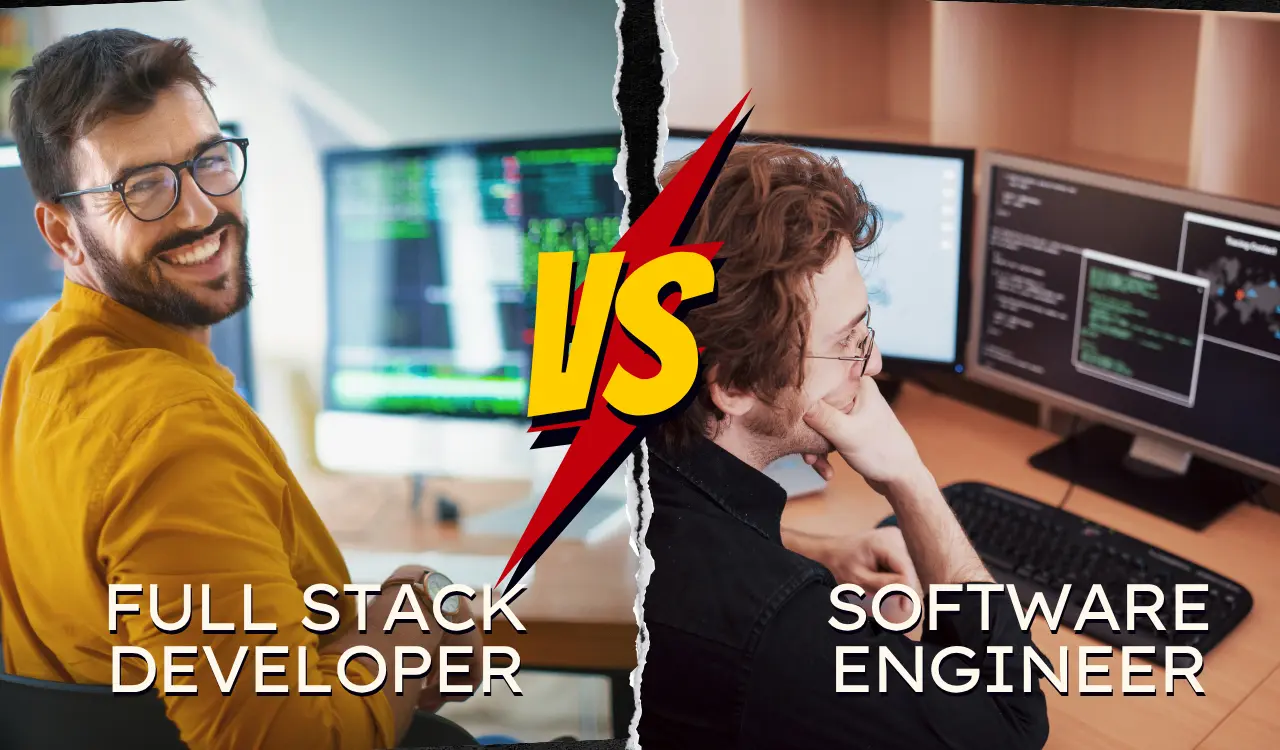
Full Stack Developer vs Software Engineer – A Complete Guide for Businesses and Developers
In today’s digital-first world, the debate of Full Stack Developer vs Software Engineer is more relevant than ever. These terms are used synonymously by many individuals, particularly non-technical founders or new job seekers. And yet the fact is, they are not alike. Although the two jobs are similar in that they all write code and solve problems, and create digital products, their responsibilities, skills, and objectives differ.
This difference may assist you in making more intelligent hiring choices, scheduling your own project, and even directing your own tech career. It will make every business tip everything down to simple words, whether you are a business owner planning to create your product, a recruiter creating a team, or a developer looking at the best career to follow.
What is a Full Stack Developer?
A Full Stack Developer is a multi-skilled specialist capable of operating in front-end, back-end functions. They are referred to as generalists on most occasions since they are in a position to deal with various tasks throughout the development process.
Handling the front-end interface, they use React or Vue.js, as well as handling back-end logic and data, they make use of Node.js or Django. They will be able to handle databases as well as simple server configurations and rollouts with platforms like Firebase or AWS.
Full-stack developers are particularly useful in small or start-up environments where an individual might have to work in place of many people. These are also used to implement ideas in faster ways, and as such, they are well-suited to MVPs (Minimum Viable Products) and a speedy response to product development.
What is a Software Engineer?
A Software Engineer is more specialized. They are concerned with the application of engineering concepts in developing a stable, scalable, and secure software. Software Engineers tend to specialize much more in a single field, such as infrastructure, algorithms, cloud architecture, or security, unlike full-stack developers.
They utilize programming languages like Java or C++ and complicated tools like Kubernetes, Kafka, or Terraform. Their task is to ensure that they are able to support millions of users, heavy data loads, and performance requirements.
Software Engineers tend to work in large firms or on more mature projects where the performance, structure, and long-term stability are of more interest than the speed with which features are added.
What Is the Difference Between a Full Stack Developer and a Software Engineer?

Now that we know what each role does, let’s look at the key differences between them. This is where the Full Stack Developer vs Software Engineer debate becomes clearer.
Scope of Responsibility: Breadth vs Depth
A full-stack Developer is a man with a lot of hats. They are capable of developing a complete feature all by themselves – UI, APIs, and database connections. They are similar to builders who can work on all sections of a house.
A Software Engineer, on the other hand, goes deep into one field. They are architects who build robust buildings, which can last for decades. They emphasize scalability, performance, and maintainability.
Full-stack developers are ideal for the initial development. When products have to expand, Software engineers will be required.
Problem-Solving Approach: Quick Delivery vs Long-Term Planning
Speed and flexibility are the concerns of Full Stack Developers. Their usual query is: How do I develop this feature as soon as possible so that users can begin using it?
Software Engineers are concerned with stability and scale. Their question is: Are they sure that this system will be reliable when it is accessed by millions of users simultaneously?
This attitude disparity renders both functions more applicable to a certain product development phase.
Technology Stack: Flexible Frameworks vs Strong Infrastructure
Full Stack Developers deal with rapid and developer-friendly frameworks such as Next.js, Express.js, or Firebase. They enable them to create products in a short time without having to employ large teams.
The software engineers incorporate such potent and robust software as C++, Kafka, and Terraform to construct systems capable of managing large traffic, robust security, as well as complicated architecture.
Their selection of the tools indicates their priorities: speed to Full Stack Developers, and stability to Software Engineers.
Ideal Project Context: Startups vs Enterprises
Full Stack Developers are ideal in startups or early-stage businesses where speed is the most important. Only one full-stack developer will be able to develop a working product within weeks. This works very well with MVP launches and expeditious market testing.
Large organizations or high-growth products would require Software Engineers. When your system is relied upon by millions of users, such as in a banking application, health care platform, or an international SaaS, you must have well-structured systems that have been well-engineered to keep operations running smoothly.
Team Structure and Collaboration: One-Man Army vs Specialized Units
Full-stack developers are typically employed in smaller, agile organizations in teams where limited members perform the various functions of the organization. They belong to cross-functional teams that develop and add features fast.
Software engineers tend to work in dedicated sectors such as backend, infrastructure, security, or DevOps. Not all the engineers concentrate on the same discipline. The large teams can retain quality and performance as the product expands with this structure.
The most intelligent firms combine both of those jobs, Full Stack Developers to be flexible and fast, and Software Engineers to be structured and scaled.
Career Path: Generalists vs Specialists
In many cases, Full Stack Developers become technical product leads or front-end architects, or development code leads. This is because they are highly skilled and are able to handle projects on an end-to-end basis.
Software Engineers are frequently promoted to become system architects, part of an engineering team, or DevOps heads. They can scale up and manage complex systems with their strong technical expertise.
The two alternative ways are not better, as it all depends on the individual interest and business objectives.
Learning Background: Bootcamp vs Computer Science
Software Engineers are often computer science majors, which are oriented toward an approach to algorithms, data structures, and system design.
Full Stack Developers usually enter the field through boot camps or online education, or be it through design. They acquire applicable codes of practice through which they can develop and launch products in a short period.
Both avenues are good; however, the important thing is the capacity to make clean, maintainable, and efficient software.
Why Choosing the Right Role Matters
Recruiting a position not at the right time may result in delays of the project, budgetary issues, and failure to fulfill expectations. Hiring a full-stack developer will be a more prudent exercise in case you want to put together and test an idea in the shortest possible time.
However, when your product is already expanding quickly, and you can start dealing with thousands of users or complicated architecture, a Software Engineer will provide you with a framework and balance your system’s requirements.
That is why Full Stack vs Software Engineer is a highly relevant debate to businesses and Project leaders.
Common Challenges Both Roles Face
Full-stack developers and Software Engineers have to deal with rapidly changing technologies. They must remain in parity with the emerging trends such as the incorporation of AI, development based on the cloud, and enhanced cybersecurity.
Job ambiguities also create another problem. In some cases, companies may hire a full-stack developer but expect them to work as a backend architect. Or they may bring in a software engineer and expect them to build the entire product alone. Clearly defining roles helps resolve this problem and makes hiring more effective.
How to Decide Between a Full Stack Developer and a Software Engineer

Choosing between a Full Stack Developer and a Software Engineer doesn’t have to be confusing. Here’s a simple way to think about it:
Think About Your Timeline
If your timeline is short, and you want to test your idea quickly, go with a full-stack developer. They can build fast and get your product to market in less time.
Consider Your Project Scale
If your product is expected to handle thousands or millions of users, Software Engineers are the right choice. They will design your system for performance and security.
Look at Your Team Size
For small teams or individual founders, full-stack developers are perfect. For large teams or enterprise-level projects, Software Engineers ensure smooth operations and structured development.
Plan for the Future
Many companies start with full-stack developers for early development and later bring in Software Engineers when the product scales. A smart mix of both roles often works best.
How Desun Technology Can Help You Build the Right Team
Desun Technology understands that every business is at a different stage. That’s why they bring together Full Stack Developers and Software Engineers to give you the perfect balance of speed and strength.
A full-stack developer will assist you in developing and deploying quickly, and a Software engineer will ensure that your product can be developed securely and reliably. UI/UX design, cloud deployment, automated testing, and post-launch support, like it has solutions in between to take your product to the envies of its expandability, Desun Technology offers a fully end-to-end service to its clients.
Conclusion
The argument between Full Stack Developer and Software Engineer is not about organization—it’s about suitability. Full Stack Developers offer velocity, flexibility, and start-to-finish ownership, making them perfect for innovation and initial products. Software Engineers offer organization, scalability, and robustness, needed for growth and stability.
Intelligent companies don’t settle on one or the other long term. They adapt their technology talent approach as the product itself develops. In a software-driven world where competitive differentiation is defined by software, your success will not hinge on titles, but on the ability to get the right individuals to the right problems at the right time. Make good choices, design thoughtfully, and be nimble.









